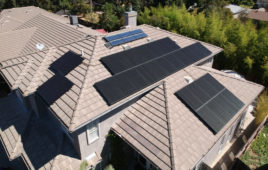The Solar Energy Manufacturing for America (SEMA) Coalition, a group of U.S. solar manufacturers claiming to represent more than 6,100 workers, sent a letter today to President Joe Biden encouraging the enactment of long-term policy solutions to sustain domestic solar manufacturing. The passage of the SEMA Act is a top request of the group.
The SEMA Coalition estimates that deployment incentives and manufacturing tax credits could lead to 30 GW of domestic solar module manufacturing capacity by 2025, along with 18,000 direct manufacturing and 60,000 indirect jobs. The group members also have plans to “have an entirely domestic solar manufacturing supply chain capable of exceeding domestic demand with nearly 100% American panels, resulting in approximately a total of 30,000 direct manufacturing jobs and over 100,000 indirect jobs by 2030 throughout the solar supply chain.”
Member companies that signed the letter:
Auxin Solar – crystalline silicon solar panel manufacturer (California)
Caelux – perovskite R&D company
CubicPV – perovskite R&D company
First Solar – thin-film solar panel manufacturer (Ohio)
Hanwha Q CELLS North America – crystalline silicon solar panel manufacturer (Georgia)
Heliene – crystalline silicon solar panel manufacturer (Minnesota, Florida)
Hemlock Semiconductor Operations – silicon manufacturer (Michigan)
Leading Edge Equipment Technologies – silicon wafer technology company
Maxeon Solar Technologies – crystalline silicon solar cell and panel manufacturer
Meyer Burger Americas – crystalline silicon solar cell and panel manufacturer (Arizona)
Mission Solar Energy – crystalline silicon solar panel manufacturer (Texas)
REC Silicon – silicon manufacturer (Washington, Montana)
Sunnova Energy International – solar system installer
Swift Solar – perovskite R&D company
Silfab Solar – crystalline silicon solar panel manufacturer (Washington)
Wacker Polysilicon North America – silicon manufacturer (Tennessee)
President Biden encouraged Congress to send the Build Back Better Act to his desk and emphasized the clean energy incentives within the bill during his State of the Union speech last week.
The Build Back Better Act is currently stalled in the Senate due to opposition from moderate Senators Joe Manchin (D-WV) and Kyrsten Sinema (D-AZ). The solar-related provisions in the bill include extended residential solar tax incentives and refundability options, new incentive options for larger projects and new domestic solar energy manufacturing tax credits.
The latest draft of manufacturing credits include: thin-film and silicon PV cells (4¢/WDC), wafers ($12/m2), solar-grade polysilicon ($3/kg) and fully assembled thin-film and silicon modules (7¢/WDC).
Based on Solar Power World data on U.S. solar panel manufacturers, domestic module assemblers can only supply less than 8 GW of modules currently, if working at full capacity. And with no domestic solar cell manufacturers, all U.S. module makers must import crystalline silicon solar cells. The SEMA Coalition believes that only with the passage of the SEMA Act and other legislation will the United States be able to start solar cell manufacturing and establish a nearly 30-GW domestic module supply chain.






